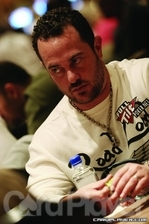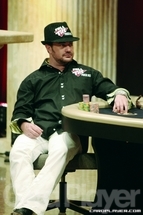






David Oppenheim: The Quiet Cash-Game KillerHe Earns a Quiet Yet Lucrative Living Playing High-Stakes Cash Gamesby Julio Rodriguez | Published: Sep 17, 2010 |
|
|
 The poker world is filled with shameless promoters and self-made household names. If notoriety isn’t earned on the felt, it is achieved through sponsorship deals, television commercials, good looks, and even reality TV. But poker is also filled with players who show up every day, quietly take your money, and leave without being noticed.
The poker world is filled with shameless promoters and self-made household names. If notoriety isn’t earned on the felt, it is achieved through sponsorship deals, television commercials, good looks, and even reality TV. But poker is also filled with players who show up every day, quietly take your money, and leave without being noticed.
One such player is high-stakes cash-game grinder David Oppenheim. The 37-year-old pro has been a consistent winner in the biggest games in the world for nearly two decades, but he somehow has managed to remain in the shadows of the poker community. While his peers — such as Doyle Brunson, Phil Ivey, Jennifer Harman, Sammy Farha, and Johnny Chan — have spent their time in the spotlight, Oppenheim is one of the few regulars in Bobby’s Room who hasn’t been properly recognized for his accomplishments.
Recently, Oppenheim was featured on ESPN’s World Series of Poker coverage of the $50,000 Players Championship, which was won by Michael “The Grinder” Mizrachi. The two-hour episode gave viewers a glimpse of the relatively unknown Oppenheim, but in this long-overdue story, Card Player takes a better look at one of poker’s greatest players.
A Poker Pedigree
Listening to Oppenheim talk about his childhood, it’s almost impossible to envision a career for him in anything other than poker. “My parents played professional poker when I was growing up,” he said. “They had an office-supply company, but they always supplemented their income with poker. There was a good six- or seven-year stretch when that was all they did. At the time, they were playing $20-$40 five-card draw and lowball, which were the standard games back then. It was a different time for poker.”
Oppenheim grew up in Canoga Park, California, in a middle-class family with his parents and younger sister. Although his parents clearly were gamblers, Oppenheim was quick to point out why they never graduated from their medium-stakes games.
“My parents were pretty conservative, so I don’t think it was really in their nature to move up in limits,” he said. “You have to be born with a certain gamble and ambition to put it all on the line. I think they were just more concerned with providing for the family.”
His parents may not have had the trait, but even in his early years, it was clear that Oppenheim’s desire to win trumped all else. “I played a ton of sports while growing up,” he said. “That was my childhood. I was always super competitive, and sports gave me the opportunity to consistently come out on top. I guess that I tried harder to win than most people. It was that important to me.”
While his sister eventually went on to become a therapist and social worker, Oppenheim wasn’t averse to following in his parents’ footsteps. Little did he know, however, that he would go on to blaze a trail of such tremendous success.
Movin’ On Up
Poker was a big part of the Oppenheim household, so it’s not surprising that David picked up the game at an adolescent age. “I was really young when I started playing with friends, but I was 16 when I made my first trip to the casino to play cards,” he recalled. “I remember that my friend and I would leave school at around 9 a.m., change into some dress clothes, and play poker until baseball practice started at around 2:30. There was one security guard at The Bicycle Club [now The Bicycle Casino] who always gave us a hard time, but he was really the only guy who seemed to know that we were underage. Once I turned 18, I got a fake ID, and from there it was no problem.”
With his ID in hand, Oppenheim spent the better part of his freshman year in college at the tables, and it wasn’t long before he was reconsidering school altogether. “I was playing poker very casually until I enrolled at Cal State Northridge. I started off with $10-$20 limit hold’em and did well. I was very good about keeping records, and I ended up making $45,000 the first year. As a broke college student, that was all the money in the world. I felt like a millionaire. My second year of college didn’t go very well. I was doing so well in poker and moving up the limits so fast that I just wasn’t concentrating on school. I had just turned 19, but I had already moved up to $200-$400 stakes. Needless to say, I dropped out.”
Poker was profitable — very profitable — but Oppenheim didn’t drop out with any aspirations of making it a career, at least not at first. “It was never a concrete plan of mine to be a professional poker player,” he said. “I always figured that if it didn’t work out, I’d just go back to school. My parents were always supportive, but they obviously wanted something different for their son. They were aware of how stressful a career in poker could be, so they were disappointed at first that I didn’t finish school.”
Oppenheim knew the game and the players, but it was what he didn’t know that perhaps led to his early success. “I wasn’t even aware of the term ‘bankroll management.’ I started off being very conservative, but, obviously, to move as fast as I did, I wasn’t playing with the proper bankroll for the limits I was at. I remember being really, really lucky in those early years; not lucky to be winning, but lucky that I never really ran into anything disastrous. I went broke very briefly when I was 21, but I’m proud to say that was the only time.”
It wasn’t long before Oppenheim graduated to the biggest game in the casino, which featured ace-to-five single-draw limit lowball and hold’em. Here, the young up-and-comer was in the presence of some of the game’s best and most famous players.
“At the time, I was playing with players like Gabe Kaplan, Jerry Buss, Frank Mariani, Don Zewin, Yosh Nakano, Johnny Chan, Mark Weitzman, and Huck Seed. It was a tough game, but I kept beating it.”
His rise to the highest stakes was fast, but there wasn’t much more room for growth at the time. With no bigger games on the horizon, Oppenheim simply buckled down and built up his nest egg.
“It was a long road,” he recalled. “We’re talking 17 years of professional poker. From the age of 23 to 28, I was stuck between $400-$800 and $500-$1,000. There just weren’t any bigger games. I was winning consistently during that stretch, but because I wasn’t moving up anymore, it allowed me to be smart with my money and invest in some real estate. I was fortunate that I didn’t fall into some of the bad habits that have taken down so many other players.”
The Poker Boom
Late 2002 and early 2003 were big periods of time for the poker world. The World Poker Tour was a hit on the Travel Channel, and an accountant by the name of Chris Moneymaker had become the World Series of Poker main-event winner. Poker tournaments were the rage, but Oppenheim simply wasn’t interested, preferring to concentrate on the new influx of money in the cash games rather than toil away in tournaments.
 “I honestly can’t remember playing a single tournament in my 20s,” he said. “I’ve always been a bottom-line kind of guy. For me, poker was always just a way to take care of myself and my family. Don’t get me wrong, I love the feeling of getting deep in a tournament and having a chance to win, but I’m very selective when it comes to which tournaments I’ll play in.”
“I honestly can’t remember playing a single tournament in my 20s,” he said. “I’ve always been a bottom-line kind of guy. For me, poker was always just a way to take care of myself and my family. Don’t get me wrong, I love the feeling of getting deep in a tournament and having a chance to win, but I’m very selective when it comes to which tournaments I’ll play in.”
Oppenheim elaborated on why he has stuck to the side games, stating, “They say that a good player can expect to make around one big bet per hour in the long run. If you are playing stakes of $2,000-$4,000, that’s $4,000 an hour. There’s not a single tournament player on the planet who could sustain that.”
With so much disregard for tournament poker, it’s hard to believe that Oppenheim has managed to rack up an impressive $1.4 million in tournament earnings despite an extremely limited playing schedule. At this year’s World Series of Poker, he even made a televised run in the $50,000 Players Championship, where he finished in third place and earned just over $600,000.
The Venues
These days, Oppenheim rarely has to leave his house for work. Apart from the two-and-a-half months that he spends at Bellagio in Las Vegas and his weekend stud game at the Hustler Casino, he has become a big winner in the online mixed games. Although he’s been playing with the best for nearly his entire career, he did admit to experiencing an adjustment period when he first began experimenting with online play.
“I started playing online at Paradise Poker, but I didn’t get serious until Full Tilt Poker came along. It’s an entirely different animal. There was definitely a learning curve for me, just because I was lacking some of the information that you get from live play.”
Some of his edge may be gone due to the absence of live tells, and player anonymity, but Oppenheim is happy with the seven-game mix that he plays on Full Tilt. “The biggest game at Commerce Casino right now is $400-$800, and maybe $600-$1,200. I can find several of those games online at any time.”
The other benefit, of course, is that Oppenheim gets to spend more time with his wife of nine years, his three children, and his four dogs at their hillside mansion in Calabasas, California.
He Gets No Respect
Despite his ESPN appearance and an earlier Travel Channel appearance when he made the final table of a WPT event at the Borgata in Atlantic City, Oppenheim remains one of poker’s most unrecognized superstars in waiting. Although he wouldn’t disclose his lifetime cash-game earnings, he is considered to be in the upper echelon in terms of player success. Yet, he doesn’t begrudge any of his more famous yet less flourishing counterparts.
“If the fame and notoriety had happened, that would’ve been great, but it wasn’t something I was actively seeking. The guys who are famous have worked really hard at promoting themselves, and they deserve everything they get.”
 Oppenheim displays a humble attitude about how the game has treated him and doesn’t feel like he’s owed anything. “I’m not at all upset at how it has all played out. I just try to remember how much poker has provided for me and my family, and I’m entirely grateful. Would it be nice to be recognized for my accomplishments over the last two decades of play? Of course, but I’d much rather have the respect of my peers. They know better than anyone who the best players in the world are.”
Oppenheim displays a humble attitude about how the game has treated him and doesn’t feel like he’s owed anything. “I’m not at all upset at how it has all played out. I just try to remember how much poker has provided for me and my family, and I’m entirely grateful. Would it be nice to be recognized for my accomplishments over the last two decades of play? Of course, but I’d much rather have the respect of my peers. They know better than anyone who the best players in the world are.”
It’s those same peers who have, along with Oppenheim, stood the test of time. Players come and go, and many have experienced flash-in-the-pan success, but Oppenheim’s work ethic and desire to win have made him a model of consistency in the high-stakes poker community. Hopefully, the rest of the poker world will stand up and take notice, as well. 
Oppenheim’s Rules for Success
Rule No. 1: I think it is very important to be aware of your skill level, and to stay within yourself. Anyone can be a winning poker player, as long as he doesn’t play above his head. That doesn’t mean that you shouldn’t challenge yourself against better competition, but it does mean that you should stick with the game plan that works for you.
 Rule No. 2: I notice that young players today are too focused on what their opponents are doing wrong and tend to completely ignore what they are doing right. All players, no matter what their skill level is, have something they can teach you about the game that will help you progress as a player. That was a big part of my evolution in poker when I was just starting out.
Rule No. 2: I notice that young players today are too focused on what their opponents are doing wrong and tend to completely ignore what they are doing right. All players, no matter what their skill level is, have something they can teach you about the game that will help you progress as a player. That was a big part of my evolution in poker when I was just starting out.
Rule No. 3: Poker is a very consuming game. It’s very easy to lose your sense of reality when you are playing this game. Even winning can be a bit of a drain, because it’s never enough. It becomes a driving force to acquire more and more. It happens to everyone. All you can try to do is be consistent and look at it from a long-term perspective. 
Features
The Inside Straight
Featured Columnists
Strategies & Analysis
Commentaries & Personalities